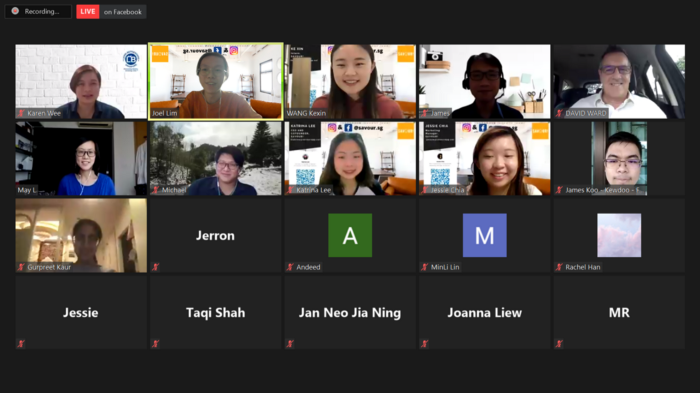
Highlights from Savour!’s Webinar on Cost-efficiency for Companies and Charities: How to tap on Digitalisation & Sustainability
On 13th of March 2021, Savour! successfully conducted its 3rd webinar on the topic ‘Cost-efficiency for Companies and Charities: How to tap on Digitalisation & Sustainability’. We were joined by an interactive and energetic audience consisting of over 20 attendees.
First of all, a big thank you to all those who joined and made this webinar a hit. Secondly, for all those who missed it, here is a run-down of the key takeaways of the insightful points shared by our wonderful panel, well represented by the corporates and charities:
- James Lin — Global Assistant Procurement Manager, Unilever
- Karen Wee — Deputy Executive Director, Lions Befriender
- Michael Yiin — Managing Director, TrinityEco
- May Lau — Director of Sales Marketing, Halim Biotech
- David Ward — Founder, The Nurturing Co

The co-hosts of the event, Kexin and Joel from Savour!, kickstarted the event by focusing on the topic on the panel’s experience with cost efficiency, procurement, digitalization, and sustainability — more specifically their respective organizations’ practices, and how they’ve changed with the recent pandemic. The panel then went on to share tips on achieving organizational cost-efficiency and had an extensive and insightful discussion on the future of sustainability and procurement with growing digitalization in the industry.

According to James, being in the FMCG industry, Unilever relies heavily on digitalisation to keep up with the rapid-growing demand. They have even put together a data analytics team and adopted Robotic Process Automation (RPA) to reduce human intervention on certain tasks. Unilever also works actively towards commercial sustainability and sustainable sourcing (such as reducing palm footprint). On his view on future trends of digitalisation, sustainability and procurement, he believes that organisations should adopt data analytics to generate insights, as part of their operations, and that they should be quick to make decisions to remain competitive.

Deputy Executive Director of Lions Befrienders, Karen, says that despite having to overcome great resistance when they first started using technology in the eldercare sector, digitalisation has been very helpful to their organisation, especially with working with the elderly during the Circuit Breaker period. Karen believes that digitalisation is here to stay, and mindsets need to be changed in order to keep up with the industry. She also believes that with the growing use of digitalization, telemedicine and elderly use of smartphones will be part and parcel of the future of the eldercare sector.

According to May, Halim Biotech’s current strategies include tapping into Malaysia’s market, leveraging on the better exchange rate. Their flexibility and ability to adapt quickly have also been very handy in their journey towards sustainability while coping with the COVID-19 pandemic — reorganising the team to work more efficiently under the constraints of COVID-19. Citing Singapore’s Green Plan 2030, as well as the growing environmental awareness among consumers, May believes that organisations can no longer shy away from sustainability.

According to David, The Nurturing Co has shifted its sales scene from the traditional meet-ups to virtual discussions on Zoom, using more PDF documents instead of hard copy documents, due to COVID-19. To make up for the “personal touch” that would usually come with physically meeting their customers, they have turned to Customer Relationship Management (CRM) and integrating the information they get into their daily practices. On his views towards the future, David recognises the significance of the Singapore Green Plan 2030 as a necessity. He believes that the growing use of technology and social media will bring about greater transparency and spur more people to contribute to sustainability efforts.

Last but not least, Michael shares that TrinityEco has managed to hold down the fort in the uncertainty of the pandemic, because of its dedicated team who believes strongly in the business. They’ve been managing cost through providing consulting services on supermarketing, using digital systems to track customer preferences. They also help companies calculate sustainability to maximise profits. On his view on future trends of digitalisation, sustainability, and procurement, he believes that processes should be replaced by Artificial Intelligence (AI) and that there should be greater stakeholder engagement through increased supplier chain transparency. He also believes that businesses should diversify their supply chains to have a range to choose from during a crisis.
Missed out on attending the webinar but want to listen to the full sharing by our panelists?
Fret not, you can head over to this Youtube link below to watch the Zoom recording of the webinar
Written by Joel Lim
Joel Lim is a Communications and Marketing Intern at Savour!